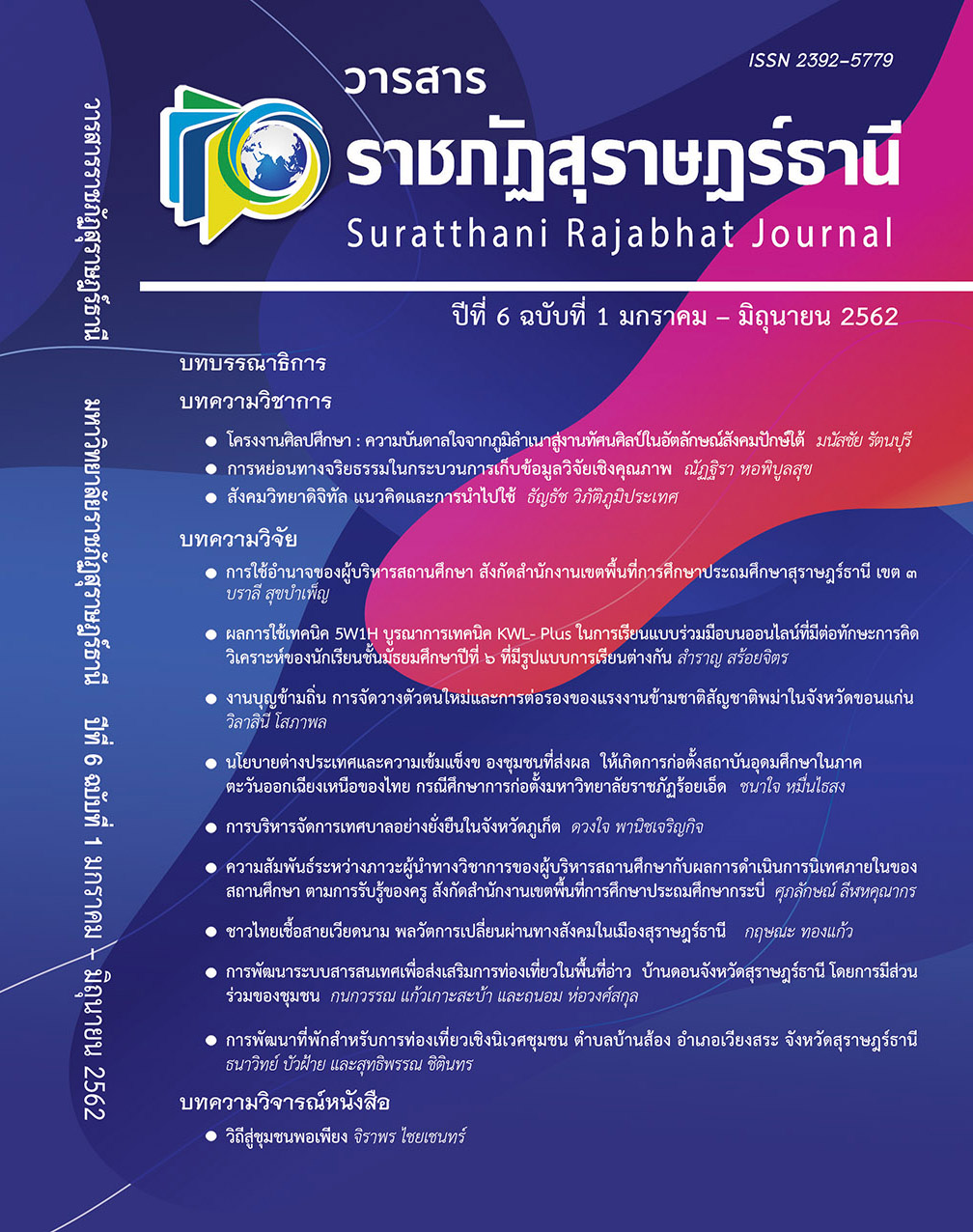Digital Sociology: Concept and Application
Main Article Content
Abstract
Digital technologies and digital media have an important role in many dimensions of the lives of most people and social relationships. Sociology as a discipline that focuses on society, everyday life and social relations has developed the concept of “digital sociology” in order to understand social phenomena of the use of digital technologies and digital media as well as their impact on society. This academic article aims to present the background of the concept of digital sociology and to describe this concept and its application by Lupton which is divided into 4 aspects in terms of 1) digital media for teaching, learning, and academic works; 2) analysis of people’s digital media use; 3) digital data for social research; and 4) critical digital sociology.
Article Details
References
ธัญธัช วิภัติภูมิประเทศ. (2559). พฤติกรรมการใช้สมาร์ทโฟนในชั้นเรียนของนักศึกษามหาวิทยาลัยธุรกิจบัณฑิตย์. วารสารสุทธิปริทัศน์, 30(95), 48-58.
ธัญธัช วิภัติภูมิประเทศ. (2560). ผลสัมฤทธิ์ทางการเรียนของนักศึกษาวิชาประชาคมอาเซียนโดยการเรียนรู้จากการผลิตสื่อ Infographic.วารสารรังสิตสารสนเทศ, 23(2), 7-20.
ปิยธิดา สมบูรณ์ธนากร, วิชญวัชญ์ เชาวนีรนาท และ สุภาพ กัญญาคำ. (2559). พฤติกรรมการใช้สื่อสังคมออนไลน์เพื่อสนับสนุนการเรียนการสอนกรณีศึกษา รายวิชาการใช้โปรแกรมกราฟิกของนักเรียนระดับประกาศนียบัตรวิชาชีพชั้นปีที่ 2 แผนกวิชาคอมพิวเตอร์ธุรกิจ วิทยาลัยการอาชีพสว่างแดนดิน.วารสารมหาวิทยาลัยนครพนม, 6(1), 115-123.
ภาณุวัฒน์ กองราช. (2554). การศึกษาพฤติกรรมการใช้เครือข่ายสังคมออนไลน์ของวัยรุ่นในประเทศไทย: กรณีศึกษา Facebook. วิทยานิพนธ์วิทยาศาสตรมหาบัณฑิต สาขาวิชาการบริหารเทคโนโลยี วิทยาลัยนวัตกรรม มหาวิทยาลัย ธรรมศาสตร์.
แสงเดือน ผ่องพุฒ. (2556). สื่อสังคมออนไลน์: แนวทางการนำมาประยุกต์ใช้ (online). สืบค้นได้จาก http://digitalasia.co.th/wpcontent/uploads/2016/12/66 85991_0 004.pdf. [2560, สิงหาคม 27].
Colaiacovo, K. (2017). An Interesting Timeline of the Evolution of Social Media (online). Retrieved from https://www.pepperitmarketing. com/facebook/evolution-social-media. [2018, March 12].
CUNY Academic Commons Community Team. (2015). Digital Sociology Mini-Conference at ESS (online). Retrieved from http://digsoc. commons.gc.cuny.edu/conference-papers-2015. [2018, March 12].
Greyson, D., Quan-Haase, A., Cooke, N. A., and Worrall, A. (2016). Digital Sociology and Information Science Research (online). Retrieved from https://onlinelibrary.wiley.com/doi/full/10.1002/pra2.2016.14 505301002 [2018, August 10].
Janzen, M. (2014). Seven Things You Need to Know about Google Classroom (online). Retrieved from http://tlt.psu.edu/2014/12/04/ hot-team-google-classroom. [2018, March 12].
Jena, R. K. (2014). The Impact and Penetration of Smartphone Usage in Student’s Life. Journal of Business Management, 8(1), 29-35.
Lupton, D. (2012). Digital Sociology: An Introduction. Sydney: University of Sydney.
Lupton, D. (2013a). Digital Sociology : Beyond the Digital to the Sociological (online). Retrieved from https://www.slideshare.net/ dlupton/ digital-sociolog-beyond-the-digital-to-thesociological. [2018, March 12].
Lupton, D. (2013b). Introducing Digital Sociology (online). Retrieved from https:// www.researchgate.net/publication/248381396_Introducing _digital_sociology. [2018, March 12].
Lupton, D. (2015). Digital Sociology. London : Routledge.
Marres, N. (2017). Digital Sociology : The Reinvention of Social Research (online). Retrieved from https://www.sociologylens.net/articletype s/opinion /digital-sociology-reinvention-social-research-noortje-ma rres-digital-technology-contributes-sociology/18108 [2018, August 10].
Neal, R. (2010). Expanding Sentience: Introducing Digital Sociology for moving beyond Buzz Metrics in a World of Growing Online Socialization. NC: Lulu Press.
Tatomirovic, T. (2016). Hashtag as a Popular Culture Phenomenon (online). Retrieved from https://www.tanjatatomirovic.com/2016/ 02/09/ hashtag-as-a-popular-culture-phenomenon. [2018, March 12].
Wynn, J. (2009). Digital Sociology: Emergent Technologies in the Field and the Classroom. Sociological Forum, 24(2), 448 - 456.


